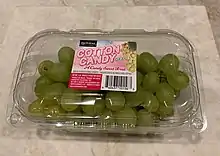Cotton Candy grapes
Cotton Candy grapes are a variety of sweet table grapes whose flavor has been compared to cotton candy. The grapes were developed by horticulturist David Cain and his team at Bakersfield, California-based fruit breeder International Fruit Genetics (IFG).[1] The grapes are produced in California by grower Grapery, which began selling them in 2011.
Development

David Cain was a fruit geneticist and former USDA researcher who co-founded IFG in Bakersfield in 2001.[2] A few months after forming the company, he attended a trade show where researchers from the University of Arkansas were showing grapes. One was a purple Concord grape that tasted sweet like cotton candy, but was fragile with tiny seeds. He licensed that grape and began working to improve the size and texture by crossbreeding the grapes with sturdier California grapes.[3] He hand pollinated to cross pollinate millions of grapes to combine the sweet Concord grapes with common grapes in order to make them firmer.[4] Pollen from male grape flowers was extracted and brushed onto the female clusters of the target plant. Over twelve years, a hundred thousand plants were created and grown in test tubes before developing the Cotton Candy variety of grape.[5] In 2010, IFG patented the grape and began licensing it to growers, including California grower Grapery.[3] Grapery was founded in 1996 by Jack Pandol, a UC Davis plant scientist graduate and third generation grape grower, and was co-owned by fellow grower Jim Beagle.[6][7]
Description
No artificial flavoring is added to give the grapes a flavor similar to cotton candy.[8] Weighing in at about 18 grams of sugar per 100 grams of grapes, the Cotton Candy grapes have about 12 percent more sugar than regular table grapes.[1]
Production and distribution
In addition to California, growers also grow the grapes in Peru, Spain, Italy, Chile, Brazil, Australia and Mexico.[9][10]
The fruit is available in every state of the US but only on a seasonal basis.[4] Retailers include Trader Joe's and Whole Foods.[7]
As of September 2017, the company's grapes were being sold in 14 countries.[9]
References
- "The Cotton Candy Grape: A Sweet Spin On Designer Fruit". NPR.org. Retrieved 2019-12-02.
- "Grape breeding firm works on varietal development". thepacker.com. 2012-07-02. Retrieved 2019-12-02.
- "Fruit breeder hits the sweet spot with Cotton Candy grapes". latimes.com. 2013-07-31. Retrieved 2019-12-02.
- "Satisfy your sweet tooth with grapes that taste like candy". cbsnews.com. 2016-08-10. Retrieved 2019-12-02.
- "The Cotton Candy Grape: A Sweet Spin On Designer Fruit". npr.org. 2013-08-06. Retrieved 2019-12-02.
- Smith, Anna (2018-01-05). "ANNA SMITH: A chat with a vineyard innovator: The man behind cotton candy grapes". bakersfield.com. Retrieved 2019-09-11.
- "OMG! Have you tried these Cotton Candy Grapes!?!?!". The Mercury News. 2018-06-26. Retrieved 2019-12-02.
- Scotti, Ariel (2017-08-23). "Cotton Candy Grapes are flying off shelves and confusing skeptics - NY Daily News". nydailynews.com. Retrieved 2019-12-02.
- "Cotton Candy grape stems from Arkansas". arkansasonline.com. 2017-09-10. Retrieved 2019-12-02.
- Lloyd, Shelley (2018-03-14). "Cotton candy grapes that taste like fairy floss hit Australian supermarkets". ABC News. Retrieved 2020-04-01.
